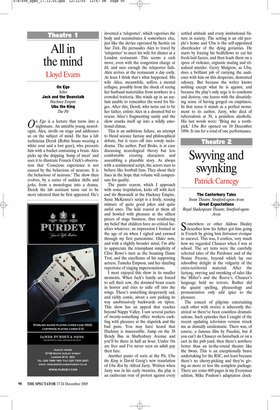All in the mind
Lloyd Evans
On Ego Soho Jack and the Beanstalk Hackney Empire Ubu the King The Pit On Ego is a lecture that turns into a nightmare. An amiable young neurologist, Alex, strolls on stage and addresses us on the subject of mind. He has a lab technician Derek (Robin Soans wearing a white coat and a lost gaze), who presents him with a bucket containing a brain. Alex picks up the dripping ‘lump of meat’ and uses it to illustrate Francis Crick’s observation that ‘Conscious experience is not caused by the behaviour of neurons. It is the behaviour of neurons.’ The show then evolves, by a series of sudden shifts and jerks, from a monologue into a drama. Derek the lab assistant turns out to be more talented than he first appeared. He’s invented a ‘teleporter’, which vaporises the body and reconstitutes it somewhere else, just like the device operated by Scottie on Star Trek. He persuades Alex to travel by ‘teleporter’ to meet his wife for dinner at a London restaurant. This seems a rash move, even with the congestion charge at £8, and sure enough the teleporter fails. Alex arrives at the restaurant a day early. At least I think that’s what happened. His wife Alice, meanwhile, suffers a mental collapse, possibly from the shock of seeing her husband materialise from nowhere in a crowded trattoria. She winds up in an asylum unable to remember the word for finger. After this, Derek, who turns out to be her father, enlists Alex in a doomed bid to rescue Alice’s fragmenting sanity and the show cranks itself up into a wildly emotional climax.
This is an ambitious failure, an attempt to blend science fantasy and philosophical debate, but it veers off into rowdy melodrama. The author, Paul Broks, is at ease discussing neurological theory but less comfortable creating characters and assembling a plausible story. As always with a sentimental script, the actors start to behave like football fans. They shout their lines in the hope that volume will compensate for quality.
The panto season, which I approach with some trepidation, kicks off with Jack and the Beanstalk at the Hackney Empire. Susie McKenna’s script is a lively, teasing mixture of quite good jokes and quite awful ones. The kids roared at them all and howled with pleasure at the silliest pieces of stage business, thus reinforcing my belief that children have no critical faculties whatever, an impression I formed at the age of six when I sighed and yawned through my first pantomime. Older now, and with a slightly broader mind, I’m able to appreciate the triumphant simplicity of Clive Rowe’s turn as the beaming Dame Trot, and the excellence of his supporting actress, Tameka Empson, and her dazzling repertoire of singing impersonations.
I most enjoyed this show in its smaller moments. When Jack’s family are forced to sell their cow, the doomed beast reacts in horror and tries to sidle off into the wings. There’s something desperately sad, and richly comic, about a cow picking its way unobtrusively backwards on tiptoe. This show has an appeal that reaches beyond Nappy Valley. I saw several parties of twenty-something office workers cackling with pleasure at the slapstick and the bad puns. You may have heard that Hackney is inaccessible. Jump on the 38 Bendy Bus in Shaftesbury Avenue and you’ll be there in half an hour. Under 16s are free and I’ve never seen an adult pay their fare.
Another panto of sorts at the Pit. Ubu the King is David Greig’s new translation of Ubu Roi by Alfred Jarry. Written when Jarry was in his early twenties, the play is an exuberant roar of protest against every settled attitude and every institutional fixture in society. The setting is an old people’s home and Ubu is the self-appointed cheerleader of the dying geriatrics. He starts by forcing his bedfellows to eat his fresh-laid faeces, and then leads them on a spree of violence, orgiastic mating and ritualised murder. Gerry Mulgrew, as Ubu, does a brilliant job of carrying the audience with him on this desperate, demented odyssey. But because the writer knows nothing except what he is against, and because the play’s only urge is to condemn and destroy, one leaves with the dissatisfying sense of having gorged on emptiness. In that sense it stands as a perfect monument to its author, Jarry, who died of tuberculosis at 30, a penniless alcoholic. His last words were: ‘Bring me a toothpick.’ Ubu Roi opened on 10 December 1896. It ran for a total of one performance.


















































































 Previous page
Previous page